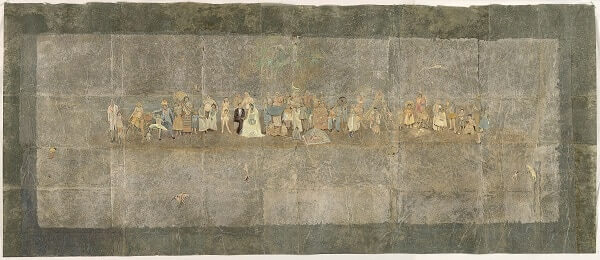The National Gallery of Victoria (NGV) Triennial is an art exhibition organised every three years which displays works of contemporary artists and designers across creative disciplines from around the world. In this year’s exhibition, Siji Krishnan’s ‘Father’s Portrait’ is on display.
The Kochi-based artist explains that her father is a recurring theme in her works which quite often fall back on her childhood memories and connections made while growing up in her village in southern Kerala.
“The most precious among all of them [memories] were the times I have spent with my father, who has passed away in 2008 since then he has been appearing recurrently in my works,” she revealed. “For me, his intense love and care were more like motherly than that of a father. It is because of these reasons father’s images are often appearing with milk filled breasts, as a manifestation of their feminine love.”
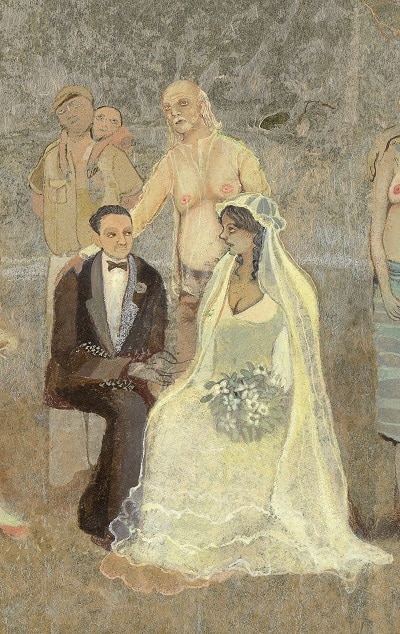
Mirchandani + Steinruecke ©Siji Krishnan
Though she has titled the work ‘Father’s Portrait’, the splendid painting has the dimension of a landscape; this is because landscapes play a significant role in Siji’s artistic expression.
“Here the landscape is too hazy and misty akin to a faint memory. Perhaps my love towards vast seashores and open plains may have some psychological reasons. In fact, such landscapes empty myself, in other words, they bring us a lot of silence and serenity,” she said.
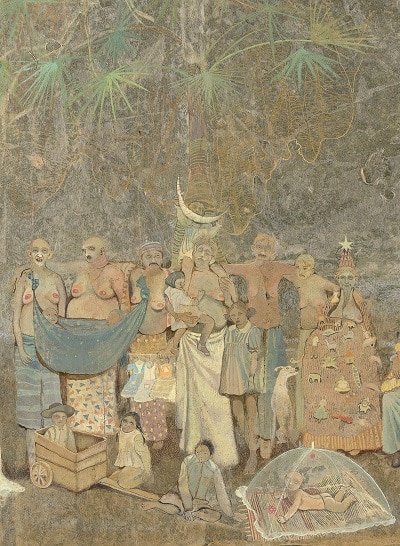
134.6 x 315.0 cm. National Gallery of Victoria, Melbourne. Ruth Margaret Frances Houghton Bequest, 2019. Courtesy Galerie Mirchandani + Steinruecke ©Siji Krishnan
Moreover, Siji Krishnan’s ‘Father’s Portrait’ is a part of a grander ‘Family Portrait’ which is almost three metres long features characters and figures she has observed in her life.
“Deep down I feel that we all are a part of a larger family which includes animals, birds, and plants. Like we human being, they too have their own stories to tell. If we listen carefully and intensely we can endlessly be enchanted by their amazing stories,” she added. “Art thrives when words fail to comprehend certain experiences.”
READ ALSO: ‘Stories of Kannagi’: a Tamil classic in the Blake Art Prize
The visual artist grew up in rural Kerala, and while visuals of rurality influenced her, even smells and sounds inspire her work.
“The stories I have listened from old people in my village and the songs I have enjoyed from the farmers in the paddy fields, they all have a great impact on my artistic imaginations,” Krishnan said.
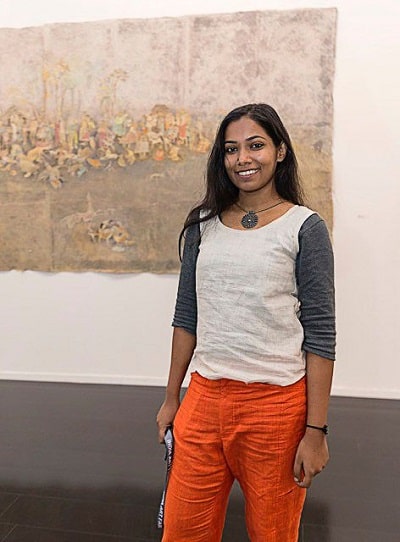
Siji Krishnan now works in a serene studio just a few kilometres away from bustling Kochi which enables her to retain “the clear sky and calming views of beautiful countryside as a source of energy” to take her work and life further.
Additionally, Siji started using rice paper (commonly used in Indian art) as a medium in 2006. It was the flexibility and feeble nature of rice paper that enabled her to explore the possibilities of this medium to a great extent.
“I have observed the fragile quality of it often supports and enhance the subtler and lighter human feelings, I was trying to bring about through the works. I often feel the pale and permissible surfaces are akin to many layers of our own memories.
“Works in my Family portrait series are done on surface made by multiple layering of rice paper, in the final result, this may look like the surface of dried leaves. I have chosen it because I felt it may support this particular series,” Siji stated.
While Siji Krishnan sadly cannot be physically present at the NGV Triennial exhibition, she expressed her delight at being part of it.
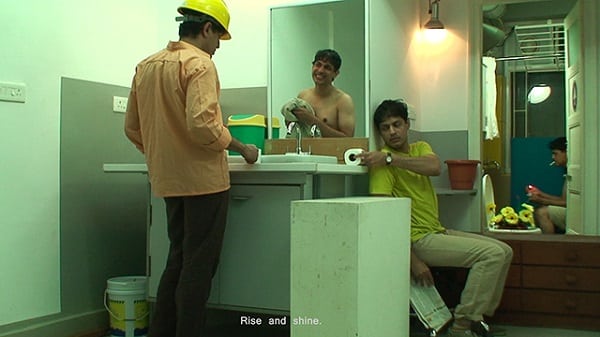
Another Indian work of art, Kiran Subbaiah’s ‘Narcissicon’ is also being showcased at the Triennial this year.
The Bengaluru-based artist’s work is a 43-minute fanciful video depicting the state of being half-asleep/half-awake, kind of like a daydream. It shows the likeness of Kiran Subbaiah playing multiple versions of himself, presented through doppelgangers and mirror reflections. The amusing and whimsical video, collated over multiple years, is meant to be a behind-the-scenes portrayal of his artistic process.
The two Indian artists’ larger-than-life artworks will be on display at the NGV Triennial in Melbourne until 18 April 2021.
READ ALSO: Falling into Ramesh Nithiyendran’s ‘outstretched arms’ at the Archibald



